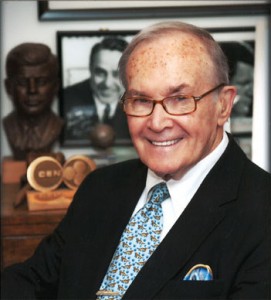The John Marshall Law School will present an honorary degree to NewtonN. Minow, a renowned communications attorney and public servant, during commencement ceremonies at 3 p.m. on Sunday, Jan. 16, 2011, at the Sheraton Chicago Hotel and Towers.
The law school will award 119 JD degrees, 52 LLM degrees, and five MS degrees during the ceremonies.
Valedictorian Stephanie Potter will address her classmates. Three faculty members will be honored. Professor Gerald Berendt will receive the Leadership and Dedicated Service Award for his work on behalf of the law school. Professor Linda Crane will receive the Leadership and
Dedicated Service Award for her initiatives on behalf of the legal profession. Professor Samuel Jones will receive the Scholarly Achievement Award. Judge Charles Kocoras of the United States District Court, Northern District of Illinois, will receive the Adjunct Faculty Teaching Award. Minow is being recognized for his work in the legal community and his public service with state and federal government agencies. After clerking for United States Supreme Court Chief Justice Fred M. Vinson, Minow returned to Illinois working as assistant counsel for Illinois
Governor Adlai Stevenson. He then worked on Stevenson’s presidential campaign. Minow continued to be active in politics. His involvement culminated with the 1960 presidential campaign of John F. Kennedy. Minow befriended Robert F. Kennedy, and the two often discussed the role of television in the lives of Americans. When John Kennedy was sworn in as president in 1961, one of his first acts was to appoint Minow chairman of the Federal Communications Commission (FCC).
Minow made headlines when, as FCC chairman, he challenged the television networks to improve their programming by considering the medium as more than a revenue stream. He also saw television as an education tool. Minow stimulated more public debate over television programming than any other chair in the history of the commission. In his first speech at
a national broadcasters’ association meeting, Minow argued that network programming was a “vast wasteland” of violence and frivolity. Minow’s comments led to much debate about the value of television programming. Budgets for news organizations increased, and he is credited
with helping stimulate the network documentary.
He helped with legislation that in 1962 created the Educational Television Facilities Act, which was followed by its successor, the Public Broadcasting Act of 1967 that created the Corporation for Public Broadcasting (CPB). He served on the board of governors of CPB from 1973 to 1980.
During his term as FCC chairman, Minow also worked for legislation that called for television sets to be able to pick up UHF signals, which enabled the ABC network to reach par with NBC and CBS. Minow’s other major accomplishmentwas the establishment of satellite communications. His work led to the International Telecommunications Satellite Consortium.
A graduate of Northwestern University Law School, Minow was an associate at Mayer, Brown & Platt before joining Stevenson, Rifkind & Weis as a partner. Minow joined Sidley & Austin, one of the most recognized communication law firms in the country, where he was a partner from 1965 to 1991. He focused on communications regulations and corporate governance
and compliance. He now has of counsel status. Since 2001, Minow has served as Honorary Consul General of the Republic of Singapore in Chicago. Minow directed The Annenberg Washington Program Communications Policy Studies at Northwestern University from 1987 to 1996, and he was an Annenberg Professor of Communications Law and Policy at Northwestern University from 1987 to 2003. He now holds professor emeritus status.
Minow is a prolific author and contributor to numerous books and publications. Among
his many writingss are How Vast the Wasteland Now, which he authored in 1991; A Digital Gift
to the Nation; Fulfilling the Promise of the Digital and Internet Age co-authored in 2001; and Inside the Presidential Debates: Their Improbable Past and Promising Future, co-authored in 2008. He has given of his time to serve on dozens of boards of directors, and has received numerous honorary degrees and awards including the Paul Simon Public Service Award and the Common Sense Lifetime Public Service Award in 2006.

